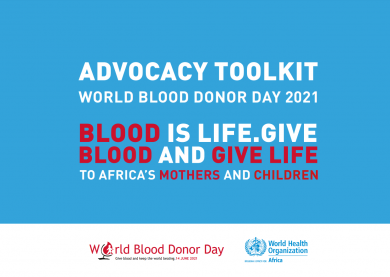
Advocacy toolkit for World Blood Donor Day 2021
In 2017, maternal deaths in Sub-Sahara Africa alone, accounted roughly for 66 per cent (196 000) of the 303,000 maternal deaths recorded globally. Up to 80% of these maternal deaths are directly due to five complications: haemorrhage, sepsis, eclampsia, rupture of uterus (obstructed labour), and complications of abortion. Reliable information about the individual medical causes of maternal mortality is scarce, especially in sub-Saharan Africa. Bleeding during labour, delivery, and postpartum accounts for one-third of all obstetric deaths globally and is the leading cause of maternal deaths in Africa (31%). Half of the maternal deaths from severe bleeding in the world occur in sub-Saharan Africa. About 65% of these deaths occur in the postpartum period.
It is important to note that once bleeding starts, death can occur in around 2 hours compared with 10 hours for eclampsia and 72 hours for obstructed labour. Rapid access to adequate and safe blood supplies for transfusion is critical to prevent maternal deaths due to obstetric haemorrhage. The coronavirus disease 2019 (COVID-19) affected millions of people worldwide and caused disruptions at the global level, including healthcare provision. WHO estimated that the COVID-19 pandemic caused 20% to 30% reduction of blood supply in all its six Regions. In the WHO African Region, the average blood donation rate dropped by 17% and the frequency of blood drives reduced by 25% during the COVID 19 pandemic. Demand for blood also decreased by 13%. It is, therefore, to support the supply of blood donation in the African
Region during the period of COVID-19 and beyond that, the WHO Africa Office (AFRO) seize the opportunity of the World Blood Donor Day 2021 to draw the attention of the public to the harmful effects of the lack of blood, especially on the health of mothers and children.
This advocacy toolkit is designed for everyone in Africa to support the cause of quality blood availability in communities and fully participate in the fight for maternal and child health in sub-Saharan Africa.


